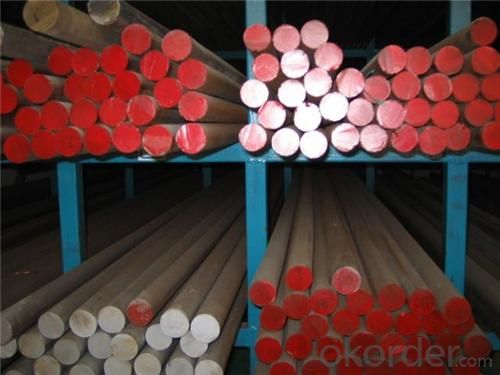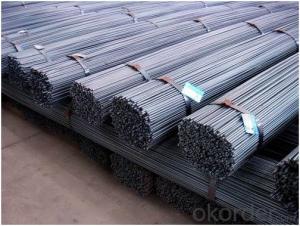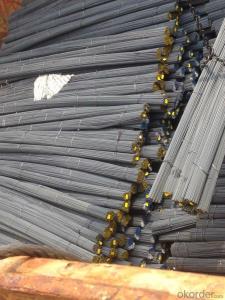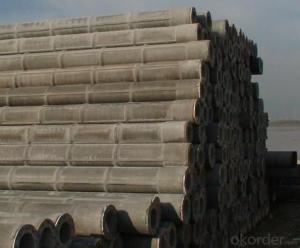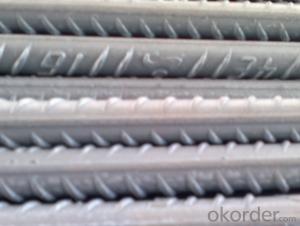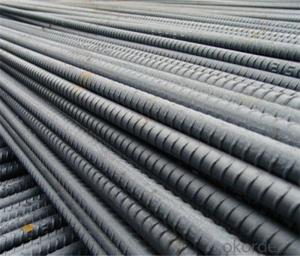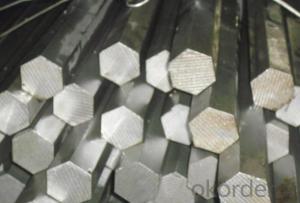Deformed Bar Steel Rebar Made in China with High Quality for Construction
- Loading Port:
- China main port
- Payment Terms:
- TT or LC
- Min Order Qty:
- 25 m.t.
- Supply Capability:
- 100000 m.t./month
OKorder Service Pledge
OKorder Financial Service
You Might Also Like
Product Description:
OKorder is offering Deformed Bar Steel Rebar Made in China with High Quality for Construction at great prices with worldwide shipping. Our supplier is a world-class manufacturer of steel, with our products utilized the world over. OKorder annually supplies products to European, North American and Asian markets. We provide quotations within 24 hours of receiving an inquiry and guarantee competitive prices.
Product Applications:
Deformed Bar Steel Rebar Made in China with High Quality for Construction are ideal for structural applications and are widely used in the construction of buildings and bridges, and the manufacturing, petrochemical, and transportation industries.
Product Advantages:
OKorder's Deformed Bar Steel Rebar Made in China with High Quality for Construction are durable, strong, and resist corrosion.
Main Product Features:
· Premium quality
· Prompt delivery & seaworthy packing (30 days after receiving deposit)
· Corrosion resistance
· Can be recycled and reused
· Mill test certification
· Professional Service
· Competitive pricing
Packaging & Delivery of Deformed Bar Steel Rebar Made in China with High Quality for Construction:
Packaging Detail: products are packed in bundle and then shipped by container or bulk vessel, deformed bar is usually naked strapping delivery, when storing, please pay attention to moisture proof. The performance of rust will produce adverse effect.
Each bundle weight: 2-3MT, or as required
Payment term: TT or L/C
Delivery Detail: within 45 days after received advanced payment or LC.
Label: to be specified by customer, generally, each bundle has 1-2 labels
Trade terms: FOB, CFR, CIF
FAQ:
Q1: Why buy Materials & Equipment from OKorder.com?
A1: All products offered byOKorder.com are carefully selected from China's most reliable manufacturing enterprises. Through its ISO certifications, OKorder.com adheres to the highest standards and a commitment to supply chain safety and customer satisfaction.
Q2: How do we guarantee the quality of our products?
A2: We have established an advanced quality management system which conducts strict quality tests at every step, from raw materials to the final product. At the same time, we provide extensive follow-up service assurances as required.
Q3: How soon can we receive the product after purchase?
A3: Within three days of placing an order, we will begin production. The specific shipping date is dependent upon international and government factors, but is typically 7 to 10 workdays.
Images:
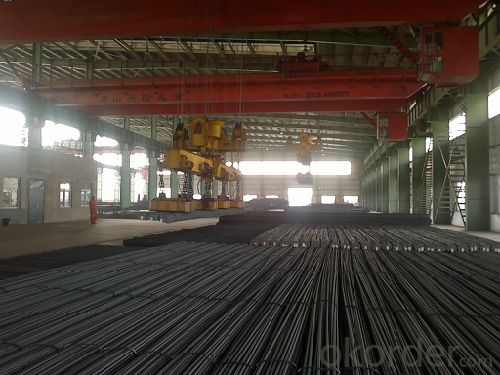
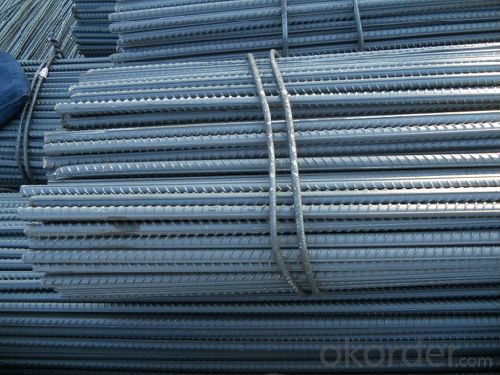
- Q: How does special steel contribute to the medical aftermarket industry?
- The medical aftermarket industry heavily relies on special steel, which is essential for producing top-quality materials needed for medical devices and equipment. Special steel, also known as stainless steel, offers a wide range of advantages that make it perfect for medical applications. Above all, special steel's resistance to corrosion and rust is of utmost importance in the medical field, where hygiene and cleanliness are crucial. Medical devices like surgical instruments, implants, and equipment require frequent sterilization, and the corrosion resistance of special steel guarantees their durability and long-lasting nature. Moreover, special steel possesses exceptional strength and hardness properties, making it suitable for medical implants and prosthetics. These implants must be able to withstand the stresses and strains of the human body while maintaining their structural integrity. Special steel provides the necessary strength and toughness required for these critical applications. Furthermore, special steel is biocompatible, meaning it does not cause any negative reactions or toxicity when it comes into contact with living tissues. This characteristic is vital for implants and devices that directly interact with the human body, as it minimizes the risk of rejection or allergic reactions. Additionally, special steel's versatility allows for easy machining and fabrication into complex shapes and sizes, meeting the diverse requirements of medical applications. It can be shaped into delicate surgical instruments, precise cutting tools, and even large-scale equipment like hospital beds and imaging machines. The high precision and dimensional stability of special steel contribute to the accuracy and reliability of medical devices, especially in areas like diagnostics and imaging. Precise measurements and high-quality images are essential for accurate diagnosis and treatment planning, and special steel helps achieve these goals. In conclusion, special steel's corrosion resistance, strength, biocompatibility, and versatility make it an invaluable material in the medical aftermarket industry. Its use in manufacturing medical devices and equipment ensures the highest standards of hygiene, durability, and performance, ultimately contributing to the advancement of healthcare and improving patient outcomes.
- Q: What are the different methods of joining special steel?
- There are several methods of joining special steel, including welding, brazing, soldering, and mechanical fastening. Welding involves melting and fusing the steel pieces together using heat, while brazing and soldering use a filler metal with lower melting points to join the steel. Mechanical fastening methods, such as bolting or riveting, rely on physical connections to hold the steel pieces together without altering their properties. Each method has its own advantages and limitations, and the choice depends on factors such as the type of steel, the desired strength, and the specific application.
- Q: What are the requirements for special steel used in cryogenic applications?
- The requirements for special steel used in cryogenic applications include high strength and toughness at low temperatures, resistance to thermal stresses, low thermal conductivity, and the ability to maintain mechanical properties even in extremely cold environments. Additionally, the steel must possess excellent corrosion resistance to prevent degradation in cryogenic fluids and be able to withstand the extreme temperature cycling that occurs during cryogenic processes.
- Q: How does the composition of special steel affect its properties?
- The composition of special steel greatly affects its properties. By adjusting the levels of various elements such as carbon, chromium, manganese, and nickel, the hardness, strength, corrosion resistance, and heat resistance of the steel can be altered. For example, increasing the carbon content in steel can enhance its hardness and strength, while adding chromium can improve its resistance to corrosion. Overall, the composition of special steel plays a crucial role in determining its specific properties and suitability for various applications.
- Q: How is boron steel used in automotive safety applications?
- Boron steel is used in automotive safety applications due to its high strength and ability to absorb and distribute impact energy. It is commonly used in the construction of safety cages, reinforcements, and components such as side impact beams, door beams, and crash boxes. Its exceptional crashworthiness properties help improve the structural integrity of vehicles, enhance occupant protection, and reduce the risk of serious injuries during accidents.
- Q: What are the different methods of surface tumbling for special steel?
- There are several methods of surface tumbling for special steel, including barrel tumbling, vibratory tumbling, and centrifugal tumbling. Barrel tumbling involves placing the steel parts in a rotating barrel with abrasive media, which helps to remove burrs, sharp edges, and surface imperfections. Vibratory tumbling uses a vibrating machine with abrasive media to achieve similar results. Centrifugal tumbling, on the other hand, involves placing the steel parts in a rotating drum and using centrifugal force to propel abrasive media against the surfaces, resulting in a smooth and polished finish.
- Q: How does special steel contribute to the automotive sector?
- Special steel contributes to the automotive sector by offering enhanced strength, durability, and resistance to wear and tear. It is used in various critical components such as engine parts, suspension systems, and safety features, improving performance, safety, and overall reliability of vehicles. Additionally, special steel enables the development of lightweight designs, aiding in fuel efficiency and reducing emissions.
- Q: What are the different wear-resistant grades of special steel?
- In the market, one can find various grades of special steel that are resistant to wear. Each grade has its own unique properties and applications. Some commonly used grades include: 1. D2 Steel: This grade is known for its high resistance to wear and its exceptional toughness. It is often utilized in the manufacturing of cutting tools, punches, and dies. 2. M2 Steel: M2 steel is a type of high-speed steel that exhibits remarkable resistance to wear and heat. It is commonly employed in the production of drill bits, milling cutters, and other tools that require high hardness and wear resistance. 3. A2 Steel: A2 steel is a versatile grade known for its excellent resistance to wear and toughness. It is frequently utilized in the manufacturing of cold work tools, such as blanking dies and gauges. 4. O1 Steel: O1 steel is an oil-hardening tool steel that possesses good wear resistance and dimensional stability. It is commonly used in the production of blades, punches, and other cutting tools. 5. S7 Steel: S7 steel is a grade that is highly resistant to shock and wear. It is often employed in the manufacturing of chisels, shear blades, and other tools that require resistance to impact and wear. 6. AR400 Steel: AR400 steel is a specific type of abrasion-resistant steel that has a hardness of approximately 400 Brinell. It is frequently utilized in heavy-duty applications such as mining equipment, bulldozer blades, and dump truck bodies. These examples merely scratch the surface of the various wear-resistant grades of special steel available in the market. The choice of grade depends on the specific requirements of the application, including the type and intensity of wear, operating conditions, and desired hardness. Seeking advice from a steel supplier or expert can aid in selecting the most suitable grade for a particular application.
- Q: What is the difference between stainless steel and special steel?
- Stainless steel is a type of steel that contains a high amount of chromium, which makes it resistant to corrosion and staining. On the other hand, special steel refers to a wide range of alloys that are specifically designed to have unique properties, such as high strength, heat resistance, or electrical conductivity. While stainless steel is primarily used for its corrosion resistance, special steel is tailored to meet specific requirements in various industries, such as aerospace, automotive, or construction.
- Q: What are the different methods of surface electroplating for special steel?
- There are several methods of surface electroplating for special steel, including electroless plating, electroplating by immersion, barrel plating, and rack plating. Electroless plating is a chemical process that uses a reducing agent to deposit a layer of metal onto the steel surface. Electroplating by immersion involves immersing the steel in an electrolyte bath and applying an electric current to deposit a metal coating. Barrel plating is a method where the steel parts are placed in a rotating barrel along with the plating solution, creating a tumbling action that ensures an even coating. Rack plating involves suspending the steel parts on a rack and immersing them in the plating bath. Each method has its own advantages and is chosen based on the specific requirements and characteristics of the special steel being plated.
Send your message to us
Deformed Bar Steel Rebar Made in China with High Quality for Construction
- Loading Port:
- China main port
- Payment Terms:
- TT or LC
- Min Order Qty:
- 25 m.t.
- Supply Capability:
- 100000 m.t./month
OKorder Service Pledge
OKorder Financial Service
Similar products
Hot products
Hot Searches
Related keywords





